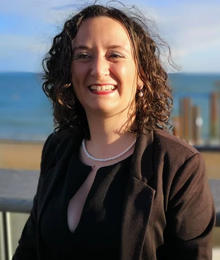An interview with Cher Farrugia
May, 2020
Cher Farrugia is a PhD student at the School of Clinical Dentistry, University of Sheffield. She is a member of the Microbiology Society, and in this interview, she tells us more about her research which focuses on the study of the oral microbiome.

Tell us about your research
I am currently a final year PhD student at the School of Clinical Dentistry, University of Sheffield. Under the supervision of Professor Craig Murdoch and Professor Graham Stafford, my PhD aims to study the role of oral micro-organisms, particularly periodontal (gum) disease bacteria in the initiation of cardiovascular disease. The association between oral diseases and systemic diseases, is nowadays well-established, but the molecular mechanisms that drive most of these associations are still highly debated in the scientific community. We are studying the effects of periodontal Gram-negative pathogens and their virulence factors on the circulation using in vitro endothelial cell models and in vivo zebrafish embryo models.
What is your area of specialism and why is it important?
My main area of interest is in oral microbiology, with a current focus on the role of oral pathogens and their virulence factors, in what is coined as the “oral-systemic link”. The mouth is one of the most heavily microbially colonised areas in our body and the oral microbiome, not only influences oral diseases (e.g. gum disease and decay), but several studies now link oral diseases (such as periodontal disease) and associated pathogenic micro-organisms, to several systemic diseases including cardiovascular disease. Nonetheless, knowledge on the mechanisms that drive these associations and awareness of the roles of the oral microbiome is still lacking.
What are the most important skills you need for your current role?
In my opinion a genuine interest in your area of research, inquisitiveness and the ability to quickly learn new skills are the most important for any PhD role. Being able to multitask, analyse data, conduct experiments and communicate your research to a wide variety of audiences are also very beneficial.
What qualifications did you obtain before starting this role?
I qualified as a dentist in 2012 and completed an MSc in Restorative Dentistry in 2014. My MSc research focused on the interaction of dental biomaterials with the oral environment and their antimicrobial properties, as well as standardisation of antimicrobial testing. Research on how materials interact with the oral environment led to an interest in how oral micro-organisms interact with human tissues and cells, particularly in our mouths and beyond, which led me to my current role.
What are the professional challenges that present themselves and how do you try to overcome them?
I think the biggest challenge in academia, is the uncertainty that surrounds early stage positions. It is very difficult to balance your professional career and personal life when most jobs are based on short-term contracts, potentially miles away from friends and family. As someone with a clinical background, it is also very challenging to keep clinical development under check and sometimes it feels as if the “career checklist” of skills that one needs is never ending and everchanging. I try to overcome these challenges by trying to take each day at a time. I try to build a wide range of skill sets and actively seek a supportive environment, both in my personal life and at work.
What is a typical working day for you?
Prior to COVID-19 related public health measures, a typical day was mainly spent planning, conducting and analysing experiments with some degree of meetings, seminars or lectures throughout the day, depending on the day of the week. Nowadays a typical day involves online meetings and webinars and several attempts at writing up potential scientific papers and thesis chapters.
Tell us about your biggest professional achievement(s) so far.
I think my biggest achievement so far has been receiving the University of Sheffield scholarship I am currently on and further securing grants and prizes from external organisations, which are leaders in the dental field, such as the Oral and Dental Research Trust and the British Society of Periodontology.
Why is it important to be a member of an organisation like the Microbiology Society?
Organisations like the Microbiology Society provide members with a sense of community and a platform to connect with likeminded individuals, and are also a great place to allow mixing of ideas across specialities, as well as raise awarness on areas which might be either niche or less focused on at that particular time. I think it is especially important for early career researchers (ECRs), as one can take advantage of the activities organised by the Society to network, develop skills and potentially benefit from grants offered by the society.
Where did your interest in microbiology come from?
From a young age, I was drawn to science and found the concept of living things, which cannot be seen with the naked eye, very intriguing. This interest grew during my dentistry undergraduate and postgraduate training, where microbiology plays a huge part in the most common diseases (gum disease and decay), we see and treat every day as dentists and is an area with still a lot of unknowns due to the complex nature of the oral microbiome.
Why does microbiology matter?
Microbiology affects, and sometimes even dictates the life we live. Our food, the environment around us, our health and everyday practices are all influenced in one way or another by micro-organisms, their products and their interactions, be it with the environment, animals, themselves, or us humans.


